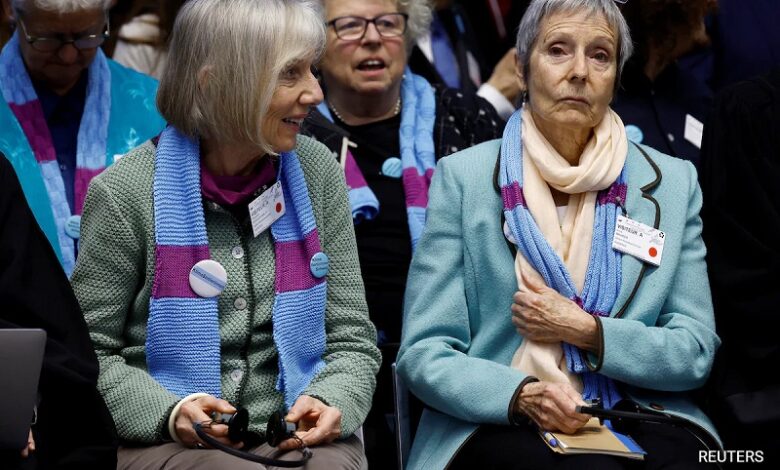Swiss women win landmark climate case at Europe top human rights court
The Swiss women, known as KlimaSeniorinnen and aged over 64, said their government's climate inaction put them at risk of dying during heatwaves. They argued their age and gender made them particularly vulnerable to such climate change impacts.

- Human rights court: Swiss climate policies fell short
- Case brought against Bern by 2,000 senior Swiss women
- Mixed ruling as court throws out two other climate cases
STRASBOURG, France, April 9 (Reuters) – Europe’s top human rights court ruled on Tuesday that the Swiss government had violated the human rights of its citizens by failing to do enough to combat climate change, in a decision that will set a precedent for future climate lawsuits.
The European Court of Human Rights’s ruling, in favour of the more than 2,000 Swiss women who brought the case, is expected to resonate in court decisions across Europe and beyond, and to embolden more communities to bring climate cases against governments.
But in a sign of the complexities of the growing wave of climate litigation, the court (ECtHR) rejected two other climate-related cases on procedural grounds. One of these was brought by a group of six Portuguese young people against 32 European governments and another by a former mayor of a low-lying French coastal town.
The Swiss women, known as KlimaSeniorinnen and aged over 64, said their government’s climate inaction put them at risk of dying during heatwaves. They argued their age and gender made them particularly vulnerable to such climate change impacts.
In her ruling, Court President Siofra O’Leary said the Swiss government had failed to comply with its own targets for cutting greenhouse gas emissions and had failed to set a national carbon budget.
“It is clear that future generations are likely to bear an increasingly severe burden of the consequences of present failures and omissions to combat climate change,” O’Leary said.
One of KlimaSeniorinnen’s leaders, Rosmarie Wydler-Wälti said she was struggling to grasp the full extent of the decision.
That’s the hope of researchers who are wiring up coffee plants with solar powered sensors.
“We keep asking our lawyers, ‘Is that right?’. And they tell us ‘it’s the most you could have had. The biggest victory possible’.”
The Swiss Federal Office of Justice, which represented the Swiss government at the court, took note of the ruling.
“Together with the authorities concerned, we will now analyse the extensive judgment and review what measures Switzerland will take in the future,” it said in a statement.
CLIMATE LITIGATION ON THE RISE
The cases before the 17-judge panel in Strasbourg, France, are among the increasing number of climate lawsuits brought by citizens against governments that hinge on human rights law.
The verdict in the Swiss case, which cannot be appealed, will have international ripple effects, most directly by establishing a binding legal precedent for all 46 countries that are signatories to the European Convention on Human Rights.
It indicates Switzerland has a legal duty to take greater action on reducing emissions.
If Switzerland does not update its policies, further litigation could follow at the national level and courts could issue financial penalties, Lucy Maxwell, co-director of the non-profit Climate Litigation Network, said.
Switzerland has committed to cutting greenhouse gas emissions by 50% by 2030, from 1990 levels. Bern had proposed stronger measures to deliver the goal, but voters rebuffed them in a 2021 referendum as too burdensome.
The verdict could also influence future rulings at the Strasbourg court, which had put six other climate cases on hold pending Tuesday’s decisions.
These include a lawsuit against the Norwegian government that alleges it violated human rights by issuing new licences for oil and gas exploration in the Barents Sea beyond 2035.
“(It) sets a crucial legally binding precedent serving as a blueprint for how to successfully sue your own government over climate failures,” Ruth Delbaere, legal campaigns director at global civic movement Avaaz, said of the Swiss case’s outcome.
Courts in Australia, Brazil, Peru and South Korea are considering human rights-based climate cases. India’s supreme court held in a ruling last month that citizens have the right to be free from the adverse impacts of climate change.
In the case brought by the Portuguese youngsters, the court ruled that while a state’s greenhouse gas emissions may have an adverse impact on people living outside its borders, it did not justify prosecuting a case across multiple jurisdictions.
It also noted that the young people had not exhausted legal avenues within Portugal’s national courts before coming to the ECtHR.
“I really hoped that we would win against all the countries,” Sofia Oliveira, one of the Portuguese teens, said in a statement.
“But the most important thing is that the Court has said in the Swiss women’s case that governments must cut their emissions more to protect human rights. So, their win is a win for us too and a win for everyone.”
(This story has not been edited by News Mania staff and is published from a Reuters)






